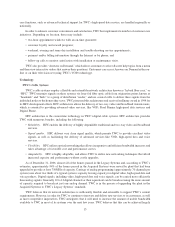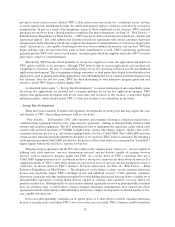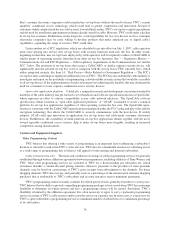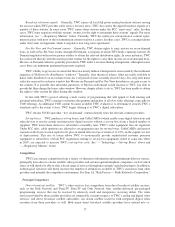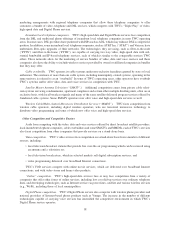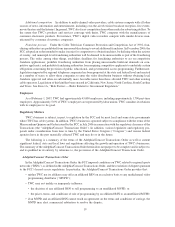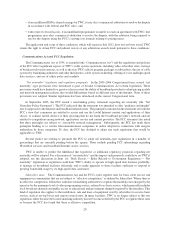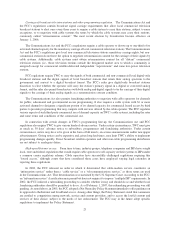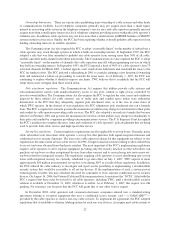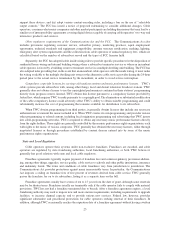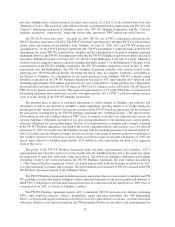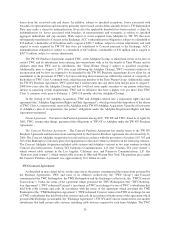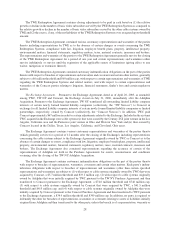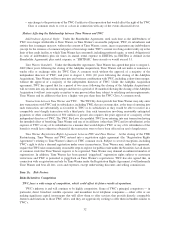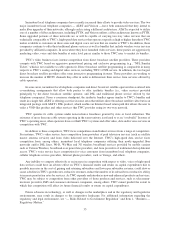Time Warner Cable 2006 Annual Report Download - page 28
Download and view the complete annual report
Please find page 28 of the 2006 Time Warner Cable annual report below. You can navigate through the pages in the report by either clicking on the pages listed below, or by using the keyword search tool below to find specific information within the annual report.support these devices; and (iii) adopt various content-encoding rules, including a ban on the use of “selectable
output controls.” The FCC has issued a notice of proposed rulemaking to consider additional changes. Cable
operators, consumer-electronics companies and other market participants are holding discussions that may lead to a
similar set of interoperability agreements covering digital devices capable of carrying cable operators’ two-way and
interactive products and services.
Other regulatory requirements of the Communications Act and the FCC. The Communications Act also
includes provisions regulating customer service, subscriber privacy, marketing practices, equal employment
opportunity, technical standards and equipment compatibility, antenna structure notification, marking, lighting,
emergency alert system requirements and the collection from cable operators of annual regulatory fees, which are
calculated based on the number of subscribers served and the types of FCC licenses held.
Separately, the FCC has adopted cable inside wiring rules to provide specific procedures for the disposition of
residential home wiring and internal building wiring where a subscriber terminates service or where an incumbent
cable operator is forced by a building owner to terminate service in a multiple dwelling unit building. The FCC has
also adopted rules providing that, in the event that an incumbent cable operator sells the inside wiring, it must make
the wiring available to the multiple dwelling unit owner or the alternative cable service provider during the 24-hour
period prior to the actual service termination by the incumbent, in order to avoid service interruption.
Compulsory copyright licenses for carriage of broadcast stations and music performance licenses. TWC’s
cable systems provide subscribers with, among other things, local and distant television broadcast stations. TWC
generally does not obtain a license to use the copyrighted performances contained in these stations’ programming
directly from program owners. Instead, TWC obtains this license pursuant to a compulsory license provided by
federal law, which requires TWC to make payments to a copyright pool. The elimination or substantial modification
of the cable compulsory license could adversely affect TWC’s ability to obtain suitable programming and could
substantially increase the cost of programming that remains available for distribution to its subscribers.
When TWC obtains programming from third parties, it generally obtains licenses that include any necessary
authorizations to transmit the music included in it. When TWC creates its own programming and provides various
other programming or related content, including local origination programming and advertising that TWC inserts
into cable-programming networks, TWC is required to obtain any necessary music performance licenses directly
from the rights holders. These rights are generally controlled by three music performance rights organizations, each
with rights to the music of various composers. TWC generally has obtained the necessary licenses, either through
negotiated licenses or through procedures established by consent decrees entered into by some of the music
performance rights organizations.
State and Local Regulation
Cable operators operate their systems under non-exclusive franchises. Franchises are awarded, and cable
operators are regulated, by state franchising authorities, local franchising authorities, or both. TWC believes it
generally has good relations with state and local cable regulators.
Franchise agreements typically require payment of franchise fees and contain regulatory provisions address-
ing, among other things, upgrades, service quality, cable service to schools and other public institutions, insurance
and indemnity bonds. The terms and conditions of cable franchises vary from jurisdiction to jurisdiction. The
Communications Act provides protections against many unreasonable terms. In particular, the Communications
Act imposes a ceiling on franchise fees of five percent of revenues derived from cable service. TWC generally
passes the franchise fee on to its subscribers, listing it as a separate item on the bill.
Franchise agreements usually have a term of ten to 15 years from the date of grant, although some renewals
may be for shorter terms. Franchises usually are terminable only if the cable operator fails to comply with material
provisions. TWC has not had a franchise terminated due to breach. After a franchise agreement expires, a local
franchising authority may seek to impose new and more onerous requirements, including requirements to upgrade
facilities, to increase channel capacity and to provide various new services. Federal law, however, provides
significant substantive and procedural protections for cable operators seeking renewal of their franchises. In
addition, although TWC occasionally reaches the expiration date of a franchise agreement without having a written
23


